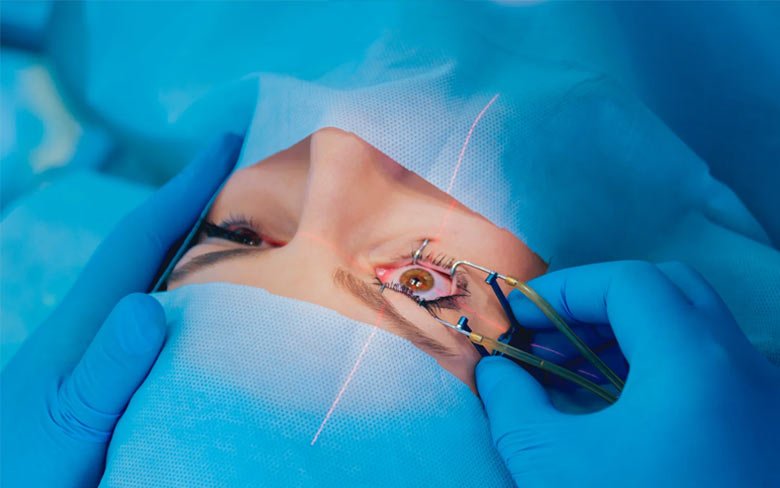General Eye Surgery
Eye Treatments
General Eye or Ophthalmology Surgery
Is a medical specialty that deals with studying the anatomy, physiology, and diseases of the eye.
To retain or restore the vision of their patients, ophthalmologists carry out different types of procedures like corneal transplants, cataract surgery, and laser eye surgeries.

Table of Contents
So What Is
- General Eye Surgery, or Ophthalmology, is a medical specialty that deals with the diagnosis, treatment, and prevention of diseases and disorders of the eye.
- It is performed by highly trained ophthalmologists using various tools and techniques to help preserve and restore the vision of their patients.
Types and Methods
There are several types and techniques of general eye surgery:
- Eyelid Aesthetics
- Eye Laser
- Smart Lens
- Cataract
- Retina Surgery
- Pediatric Eye Health
- Amblyopia
- Cornea Surgery
- Neuro-Ophthalmology
- Eye Tumor
- Myopia (Nearsightedness)
- Hypermetropia (Farsightedness)
- Glaucoma
- Strabismus Surgery
- Contact Lenses
- Uveitis (Intraocular Inflammations)
- Low Vision Rehabilitation
Treatment Plan
1. Day:
- Meet your medical consultant
- Detailed examination of your eye
- Final decision on the surgery method
2. Day:
- Consultation with your treating doctor
- Preparation and start of the surgery
- You will not feel any pain as the entire procedure is performed under local anesthesia
- Information about what you should pay attention to in the next few days
- Afterwards you will leave the hospital, go to your hotel and relax
- We strongly recommend that you diligently use the medications and eye drops that you receive from our clinic
3. Day:
- Consultation with your treating doctor
- Detailed follow-up examination of your eyes
4. Day:
If you feel ok, you can now explore Istanbul!
Go to the Grand Bazaar for shopping! Visit Hagia Sophia, the Topkapi Palace and the Basilica Cistern and take a boat trip on the Bosphorus!
5. Day:
- Final control by your treating doctor in our hospital
- Detailed examination of the surgical area
- Cleaning of the wound and changing of the bandages
- Afterward you can return home relaxed
General Eye Surgery for:
- Individuals with cataracts
- Individuals with refractive errors
- Individuals with glaucoma
- Individuals with retinal conditions
- Individuals with eyelid conditions
General Eye Surgery Duration:
- The duration of a general eye surgery can range from less than an hour to several hours depending on the type of surgery being performed.
General Eye Surgery Recovery Timeline:
- It typically takes around few days to several weeks to recover from the surgery.
- Physical activities can be resumed within a week or two.
- In some cases, patients may notice an improvement in their vision immediately following the surgery, while in other cases it may take several weeks or even months to experience the full benefits of the procedure.
Possible Risks for General Eye Surgery:
- Infection
- Bleeding
- Vision loss
- Dry eye
- Double vision
- Glaucoma
- Cataract formation
- Corneal problems
- Retinal detachment
- Anesthesia risks
Aftercare
Of course, we will also take care of you after your treatment!
After the surgery, our medical consultants will provide care for up to one year.
Our staff is available to answer any questions and provide assistance as needed. To monitor progress, we will request pictures at 2 weeks, 2 months, 6 months, and 1 year after the operation.
General Eye Surgery Healing Process
The healing process as a whole takes between 6 and 12 months.
Immediately after surgery: Your eye may be covered with a protective shield or patch, and you may experience some discomfort, redness, or tearing. Your surgeon will provide instructions on how to care for your eye, including any eye drops or medications you need to use.
First week: During this time, you should rest and avoid any strenuous activities that could put pressure on your eye. You may experience some blurry vision or sensitivity to light, and it’s important to avoid rubbing or touching your eye.
Second week: You may be able to resume some normal activities, but you should still avoid activities that could cause strain or pressure on your eye. Your surgeon may remove any stitches or sutures during this time.
First month: Your vision may still be blurry or hazy, but it should gradually improve over time. You may also experience some dryness or irritation in your eye.
First 3-6 months: Your eye should continue to heal and your vision should gradually improve. Your surgeon may recommend additional follow-up appointments to monitor your progress and adjust any medications as needed.
One year: By this time, your eye should be fully healed, and your vision should be stable and clear. Your surgeon may recommend regular eye exams to monitor your eye health and vision.

Top General Eye Surgery costs by country
The cost of general eye surgery depends on the surgeon’s experience, the technique used, the clinic or hospital you choose and your individual health status.
The prices listed below are intended to give you an approximate idea and are not a final quotation. Your MedClincs consultant will be happy to provide you with details.
| Country | Price | Rating |
|---|---|---|
| Türkiye (Turkey) | ~ 1000€ – 2000€ | ★★★★★ |
| Spain | ~ 1500€ – 3000€ | ★★ |
| Poland | ~ 1000€ – 2000€ | ★★★★ |
| USA | ~ 3500€ – 5500€ | ★★★ |
| Germany | ~ 1500€ – 2500€ | ★★★ |
Types of General Eye Surgery
FAQ
Can laser eye surgery go wrong?
While laser eye surgery is generally safe and effective, as with any medical procedure, there is always a risk of complications. However, the risk of experiencing these complications is relatively low, and most patients experience a significant improvement in their vision after the procedure. It’s important to discuss the potential risks and benefits of laser eye surgery with a qualified medical professional before making a decision about the procedure.
Can you change your eye color with surgery?
While there are cosmetic contact lenses that can temporarily change the appearance of your eye colour, there is currently no surgical procedure that can permanently change your eye colour. Some experimental surgical procedures have been developed in recent years that involve implanting coloured iris lenses in the eye to change the appearance of the iris, but these procedures are not widely available and have not been approved by regulatory agencies such as the FDA (Food and Drug Administration) in the United States. It is important to remember that any surgical procedure carries risks and potential complications, so it is not recommended to undergo a surgical procedure for cosmetic reasons alone, especially when an approved or widely accepted procedure is not available.
Is laser eye surgery safe?
Yes, laser eye surgery is generally considered safe, with a low risk of complications. However, as with any medical procedure, there are potential risks and it’s important to choose a qualified surgeon and carefully weigh the potential benefits and risks before deciding to undergo the procedure.
What are the advantages of general eye surgery in Turkey?
Turkey is an increasingly popular destination for general eye surgery due to several advantages. The country offers high-quality medical care with modern facilities and well-trained medical professionals, while remaining more affordable than many other countries. Many eye surgeons in Turkey have extensive experience and training in performing a wide range of eye surgeries, and the country has access to advanced technology and equipment. Its location at the crossroads of Europe and Asia makes it easily accessible from many different parts of the world, and its rich cultural heritage and beautiful attractions make it an ideal destination for combining medical treatment with leisure travel. It’s important to carefully consider all the factors and choose a qualified and experienced surgeon to ensure the best possible outcome.
Is general eye surgery painful?
General eye surgery is usually performed under local anesthesia, and most patients report only mild to moderate discomfort during and after the procedure. Any discomfort can usually be managed with over-the-counter pain medication, and your surgeon will provide detailed instructions for post-operative care. While every patient is different, the vast majority of patients undergoing general eye surgery do not report significant pain or discomfort.
What is a PRK eye surgery?
PRK stands for Photorefractive Keratectomy, which is a type of laser eye surgery used to correct nearsightedness, farsightedness, and astigmatism. During the procedure, the outer layer of the cornea is removed, and a laser is used to reshape the cornea to improve vision. The procedure is performed under local anesthesia and takes about 10-15 minutes per eye. PRK is considered a safe and effective option for many patients, but may require a longer healing time than other types of laser eye surgery.
What is the recovery time for eye surgery?
The recovery time for eye surgery can vary depending on the specific procedure as well as individual factors such as age and general health status. In general, however, most patients can expect an initial recovery time of about one to two weeks for most types of general eye surgery, such as cataract surgery or glaucoma surgery. For laser eye surgery such as LASIK or PRK, the initial recovery time is typically shorter, usually around 2-3 days. However, full recovery can take several weeks or even months.
It is important to follow your surgeon’s post-operative care instructions and attend all scheduled follow-up appointments to monitor your recovery and achieve the best possible outcome.
History
General Eye Surgery has been documented for centuries.
Eye surgeries were performed by ancient civilizations, including the Egyptians and Greeks, to address various conditions such as cataracts and glaucoma.
During the Middle Ages, Arab physicians played a significant role in advancing ophthalmology by contributing innovative techniques for treating eye injuries and diseases.
In the 20th century, the introduction of modern surgical techniques and technology brought forth remarkable improvements in eye surgery. The application of local anesthesia led to safer and more effective surgical procedures, while microsurgical devices enabled more precise, intricate procedures.
With the advent of laser technology in the 1960s, the field of eye surgery entered a revolutionary phase. Lasers allowed for even more precise and effective treatments, opening up a wide range of general eye surgeries that continue to this day – from cataract surgery to corneal transplants to laser vision correction.
Types of Treatments
Request Form
Get your free consultation
- Need guidance and reassurance?
- Talk to a real person from MedClinics!
- Let's find the perfect doctor together.
